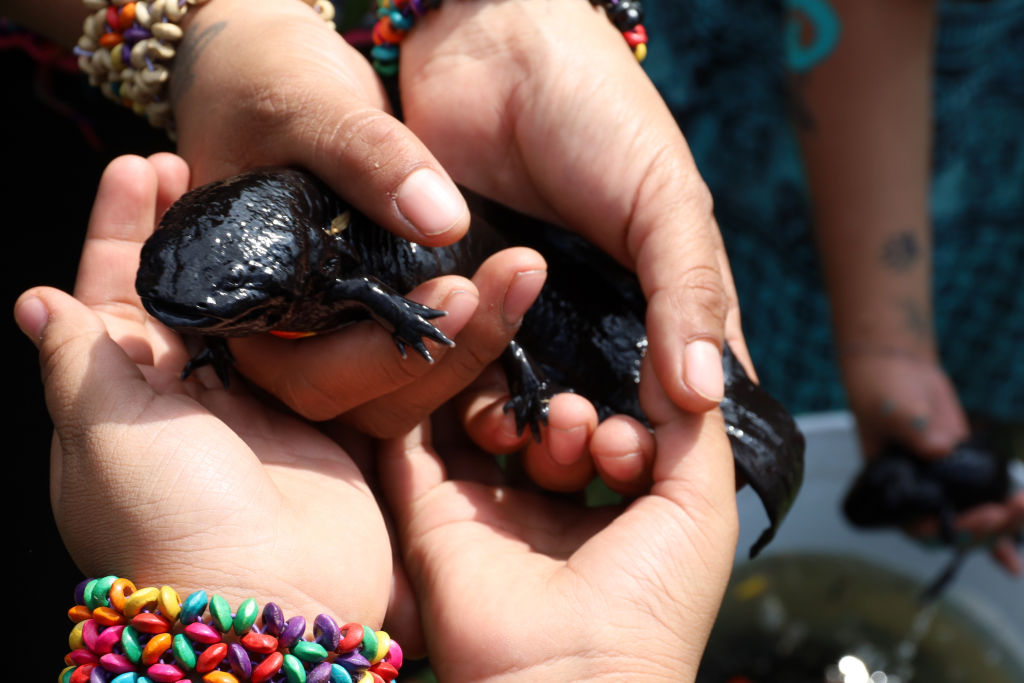Ecologists in Mexico relaunched a campaign Thursday to protect the axolotl, an iconic Mexican underwater salamander threatened with extinction.
The Adoptaxolotl 2024 campaign invites donors to adopt a threatened salamander for around 600 pesos, or $35, The Associated Press reported. A virtual adoption comes with regular updates on the amphibian’s well-being. Axolotl lovers can also buy one of the salamanders a dinner or purchase axolotl-themed t-shirts, bandannas, and mugs.
“The axolotl is at critical risk of extinction,” Luis Zambrano González, who works at the Biology Institute of Mexico’s National Autonomous University (UNAM), told the UNAM Gazette. “For this reason we need to understand its conservation as something that all of society is responsible for, to care for its habitat and develop strategies to allow people to relate more to these animals.”
There are 18 different species of axolotls in Mexico, and nearly all of them are considered critically endangered, according to AP. The salamander is famous for its unique appearance, as well as its ability to grow back severed limbs. Scientists believe that studying the axolotls’ ability may help them to repair tissue damage or aid in cancer recovery, but they will have to work fast to uncover their secrets.
Zambrano told the UNAM Gazette that axolotl numbers had rapidly declined in surveys: from 6,000 per square kilometer in 1998 to 36 in 2014, a decline of 99.5% in less than two decades.
“Thanks to these surveys we realized that the amphibian is on the edge of extinction, and if we don’t do something we will soon lose it in the wild,” Zambrano said.
The campaign, which is organized by UNAM scientists, raised more than 450,000 pesos, or $26,300, last year to launch a captive breeding program and to restore habitat in the ancient canals of the southern Mexico City district of Xochimilco, according to AP.
The scientists said that the salamanders in Xochimilco were in danger because their habitat was menaced by urbanization, pollution, and invasive species, the UNAM Gazette reported.
“There is no more time for Xochimilco,” Zambrano told AP.
So far, researchers have restored 40 floating islands and 5.5 kilometers of canal, created 36 biodiversity refuges, and installed 71 filters to improve water quality, the UNAM Gazette reported.
Axolotls are also susceptible to the chrytid fungus behind mass amphibian deaths worldwide, according to AP.
Scientists say more research is needed to truly know the extent of the damage to the axolotls’ habitat and the risk to the all of the species.
Alejandro Calzada, who works for the Mexican government monitoring less popular species of axolotl, told AP that his team of nine is not able to monitor all the streams in Mexico City or the country as a whole.
“What I know is that we have to work urgently,” Calzada said.
We have 8 days to raise $48,000 — we’re counting on your support!
For those who care about justice, liberation and even the very survival of our species, we must remember our power to take action.
We won’t pretend it’s the only thing you can or should do, but one small step is to pitch in to support Truthout — as one of the last remaining truly independent, nonprofit, reader-funded news platforms, your gift will help keep the facts flowing freely.
